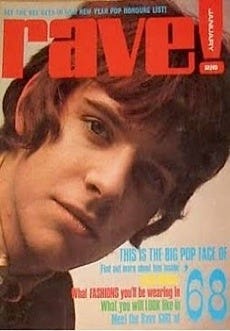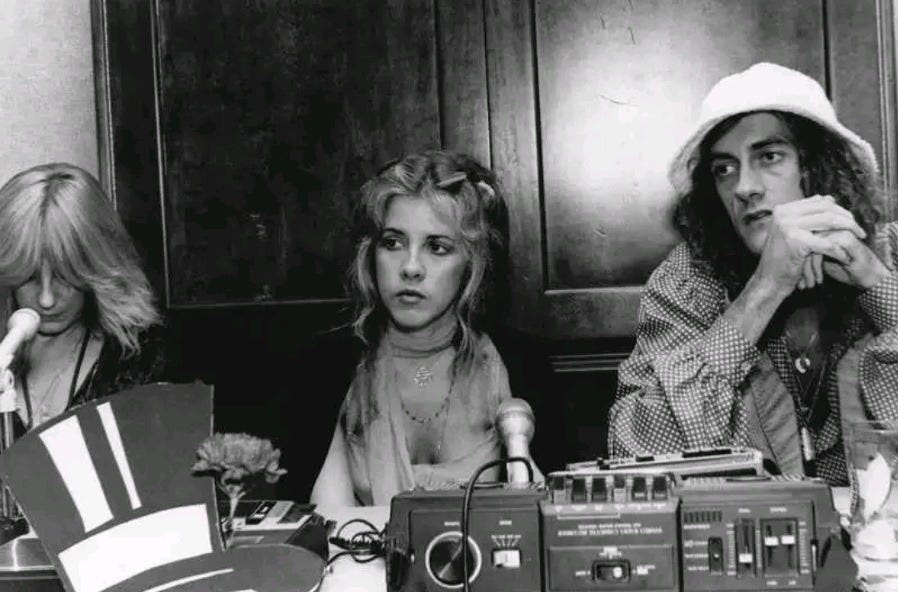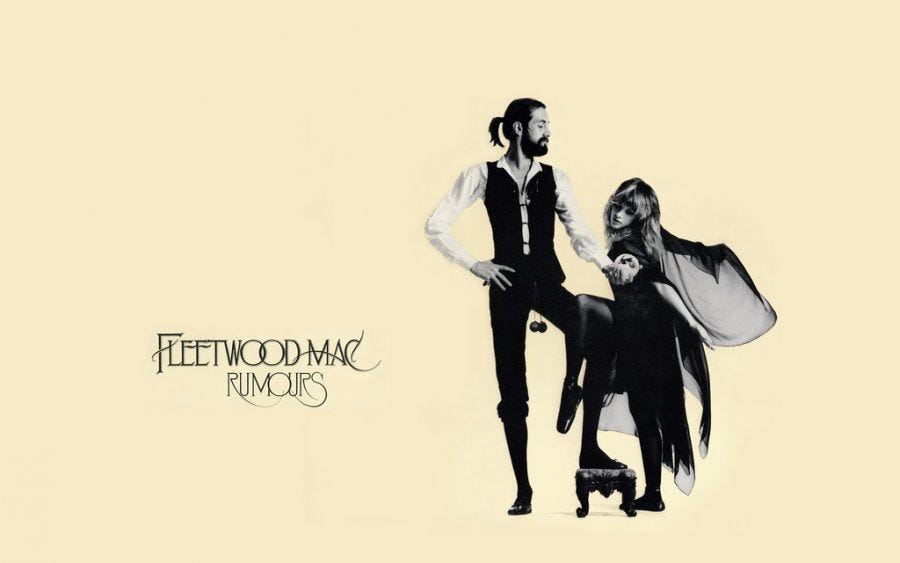The Crash of '79: Albums by Peter Frampton and Fleetwood Mac Sold Millions; Their Follow-ups Helped Crater the Record Biz
"Frampton Comes Alive" and "Rumours" set worldwide album sales records. "I'm in You" and "Tusk" prompted massive record biz lay-offs. "What the hell happened?" has been asked for decades.

Editor’s Note: This is a very general overview, as so many factors affected the late ‘70s downturn and subsequent mass lay-offs; this is my perspective from my time in radio, and from the retail end at the time, accompanied by the unforgettable chore of boxing unsold LPs to return to record companies for credit, in numbers we’d not seen before.
I point to two artists and their smash mid-’70s albums (and their respective follow-ups) as the main culprits in the shocking and abrupt downward spiral the record industry experienced by the late ‘70s.
Their labels, of course, are the ones who make their product available to the masses, sometimes with wildly extravagant publicity campaigns; their culpability won’t go unnoticed here.
By the time I made my move from Houston to L.A. in January 1980, the finely-tuned record industry machine I had witnessed on a June ‘79 visit (convincing me on the move), had deteriorated to the point where blaring headlines in the trades (Billboard, Record World, Radio & Records, et al) of massive record industry lay-offs, greeted me seven months later, and dashed any hopes I had of landing behind a label’s office desk.
When artists sell millions organically, it’s tempting to create goodies that entice radio & retail to keep feeding the beast.
The bloated industry, itself, and its rampant indulgent spending (Martin Mull promotional socks? Whole coconuts to radio personnel ahead of Dave Mason’s Split Coconut album? Really?) was also to blame, at least partially.

The Face of ‘68 and Big Mac, Front & Center
In January 1976, A&M Records released a surprising double album by a guitarist named Peter Frampton (I was at KLOL-FM/Houston at the time, and was actually in the control room when the album was delivered to the station by an A&M rep). He felt compelled to all but beg us to play this album by a journeyman artist, which is how he was viewed at the time by many throughout radio and records.

Known as Rave’s “The Face of ‘68” (and a good friend of David Bowie’s), Frampton Comes Alive! became a runaway hit for FM radio (with three AM hits, as well, all reaching Top 15), sending record-buyers to stores in droves, giving both label and artist an astounding and indisputable out-of-the-box success.
Sales figures don’t matter; it’s enough to say this record broke all records. His previous solo album, his fourth (titled Frampton), released in 1975, topped out at #32 on Billboard’s Top 200 album chart. No one saw coming the rocket launch Comes Alive! had boarded.

Related:
A Front Row Seat at Retail
A year later, in February 1977, Warner Bros. Records and Fleetwood Mac spread Rumours on an unsuspecting planet. By this time, I had left radio, and had begun a three-year stint at the retail level, at Houston’s largest vinyl retailer, Cactus Records.
Unlike Frampton, Mac’s previous album (also released in ‘75, and self-titled), was a #1 hit, although it took over a year to get there, powered as it was by “Rhiannon,” “Over My Head,” and “Say You Love Me,” all Top 20 smashes.
Mac was on an unprecedented roll, and predicting a hit with Rumours wasn’t exactly rocket science, or even a roll of a pair of ivory dice. Rumours, though, created an entirely new stratosphere to reach with their final sales figures (40 million + units worldwide to date, with 10 million + units in the first month alone)!
But, it was so far up, it was impossible to even come close the next time, apogees and perigees being what they are—a known scientific fact the label was too giddy (or greedy) to even dare consider.
Frampton and Fleetwood Mac, unwittingly, had jumped into the same sinking boat (to clumsily mix modes-of-transportation metaphors) when follow-up releases came calling.
Market Saturation, We Hardly Knew Ye: Past Sales Figures Prompt Outrageous Projections
With Frampton Comes Alive! emerging as the best-selling album of 1976, selling over 8 million copies in the US, and becoming one of the best-selling live albums to date, with estimated sales of 11 million worldwide, A&M shipped to retail the singer’s follow-up, I’m In You.

The week of May 28, 1977 saw copies of the album ship in a number of millions the label thought was justified by the sales of the double-live LP a year-and-a-half before. It’s almost like Messrs. Alpert and Moss said, “Y’know, if the live thing sold 11 million, it makes sense to ship out 12 million of this one! What could possibly go wrong?”
Frampton, himself, was well aware, at the time, of the pressure to follow up such a big album, especially with all-new material after an album of songs he knew well, recorded in concert.
“There was absolutely no need to do I’m In You then and there. The biggest mistake was just not shutting down at that point.”
“Everyone was saying, ‘Oh man, this is so good. You must feel so great,’” Frampton told Billboard in 2016. “Yeah I do, but I've got tomorrow to deal with. Hell, I've got to do a studio record to follow this up.
“And in my mind, I'm not proven in the studio, like I am now. I’m stamped ‘The Live Guy.’ So, I felt like I had lost before I started the next part of my career. Before, there was nothing to compete with. Now I felt I’m competing with ‘Peter Frampton.’”
Sure, with guests Stevie Wonder, Little Feat’s Richie Hayward, and Mick Jagger featured on the album, I’m In You ended up at #2 on the US album charts, buoyed by the title track, which peaked at #2 on the Billboard Top 100 singles chart.
“That was probably the least favorite period of my life,” Frampton, now 72, later recalled of the era and album. “The pressure was so great. There was absolutely no need to do I’m In You then and there. The biggest mistake was just not shutting down at that point.
“I had so much out there. The world was going crazy about Comes Alive! I didn't need to go and rush into something else. You're only as good as your last record, so don't put one out for a while!”
“Compared to the mega-platinum sales of its predecessor, it couldn't help but be viewed as a failure,” asserted UltimateClassicRock.com in 2017. “Within a year, the total collapse of Frampton-mania would come with a movie flop called Sgt. Pepper's Lonely Hearts Club Band.
The record industry was entering atmosphere re-entry. It seems one label, though, was leading the way to the ultimate crash, having completely forgotten to pack a parachute.
Tusk, An Elephantine Failure
Warner Bros. Records took a little longer--four months shy of 3 years--to release Mac’s follow-up to Rumours: October 12, 1979. You’d think the extra time might’ve proven to work in the band’s (and label’s) favor. Ordinarily, it might have. But, the monetary morass that became the Tusk hallmark is still the stuff of rock legend…even today.
To hear MentalFloss.com in 2014 tell it: “Four years after [Queen’s 1975] A Night at the Opera, Fleetwood Mac's 1979 LP Tusk took over the ‘most expensive rock album ever made’ designation by the media, thanks to its $1 million price tag—a number that in later years would change to $1.4 million (if only the 1979 media knew).
“[Over 40] million copies of the group's previous album, Rumours, would eventually be sold, yet Warner Brothers denied [drummer and] band manager, Mick Fleetwood, his request for the group to buy its own studio with a company advance.

“Instead, $1.4 million went to ‘custom-fitting’ Studio D at the Village Recorder in Los Angeles. In Rob Trucks' 33 1/3 book Fleetwood Mac’s Tusk, it’s said that on the very first night of recording, the whole group celebrated Mick’s new purchase of a $70,000 sports car with cocaine, before Mick received a phone call saying that the uninsured car was broadsided and demolished while being towed to his home.
“When the session ended at 6am, the night/early morning officially ended without any actual audio put to tape.
“The 20-song, double-album Tusk would sell four million records, thereby making it a profitable failure to the label. The number of copies of Rumours sold compared to Tusk’s is the all-time biggest decrease by any recording artist from one major-label album to the next.
“Excuses for its ‘disappointing sales’ include RKO radio networks playing the entire album to its cassette tape-recording-capable audiences prior to its release, and the high retail [list] price of $15.98 [over $63 in 2022 dollars].”








It's interesting to hear a music-as-business take on that moment. For me, of course, it was about the music. Like many, I liked the Frampton album for its fresh take on guitar-centric rock. But I didn't need more of that--sort of the way the first Boston album was a unique sound but all the rest sounded the same. The elephant in the room was Fleetwood Mac. I loved the Danny Kirwan-Christine McVie-Peter Green FM; I hated Buckingham-Nicks FM, and had to listen to my college roommate play it constantly. Rumours was worse, and I thought Tusk was simply awful. To me, the transformation of FM symbolized the end of whatever was left of 60's magic. It's actually shocking to compare the Billboard top 50 from 1968 vs. the top 50 from 1972--it's like popular music got a lobotomy. In 1968 the great stuff (Beatles, Cream, Doors, Hendrix, etc.) WAS the popular stuff. But then it was "Raindrops Keep Falling on my Head", and the best stuff went underground--who even knew about Velvet Underground or Patti Smith? By 1976 the patient was terminal. I was just happy for Mick Fleetwood and John McVie that they finally got to cash in on all their years working in the mines. (For me, the defibrillator was the B-52's on Saturday Night Live. But that is a whole new topic and a new world of music!) Sorry for the rant, and thanks for the Recommendation!
This was a really enjoyable and informative piece. I remember that year and the releases discussed very well, as I was an impressionable 14 in 1979 in peri-urban Philadelphia, which had a very strong album-oriented rock scene (WYSP, WMMR, etc.), and recall how heavily the Frampton follow-up and Tusk were flogged; however, one could sense that the disc jockeys knew that they were pushing the string. People forget how awful that "Sgt. Pepper" Stigwood jukebox musical movie was; after seeing it in the theatre, I distinctly remember it was one of the first times I felt I'd been thoroughly fleeced, and thinking "Peter Frampton just torched his career". Tusk was also marketed as one of the first digital recordings, and I recall listening to all that background racket and marching band music on the "Tusk" song itself and thinking "this might've actually sounded better as an analog recording".
A huge exception to all the aforementioned 1979 largess was Led Zeppelin's "In Through The Out Door", which had all sorts of gimmicky marketing and was unusually synthesizer-heavy, but really lived up to the hype and shipped six million units in the US https://en.wikipedia.org/wiki/In_Through_the_Out_Door .
Few people inflation-adjust as you did to underscore how expensive music was to buy; $63 for a double album certainly put a dent in one's summer job proceeds!
All that said, I recently popped up a note on how LP album art and liner notes really take me right back in a way even CD jewel cases never did https://substack.com/@gunnarmiller/note/c-111221089 .